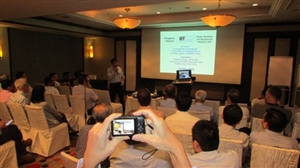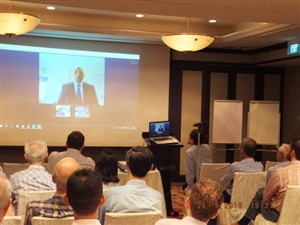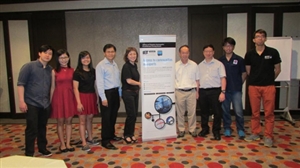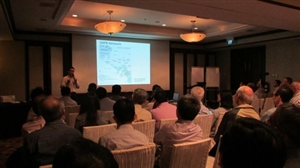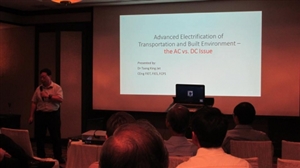About this event
Synopsis 1: Advanced Electrification of Transportation and Built Environment: AC vs DC Issue (Dr Tseng King Jet)
Electrification is the process of enabling the powering of loads by electricity. Regarded as the greatest engineering achievement in the last century, it is still an ever evolving process as factors such as energy sources, distribution infrastructure, technologies and human social values change with time. In this presentation, the issue of Alternating Current (AC) versus Direct Current (DC) is reviewed and explained in a non-technical manner for a general audience. In the early days of electricity generation, there were two competing technologies for power transmission and distribution: AC and DC. Eventually AC power generation became widely adopted due to the ease by which AC voltage may be stepped up, thereby reducing the distribution losses. However, there are applications for which DC power distribution is more advantageous and prevalent, e.g. in electrically powered railways such as the MRT system in Singapore. With growing electronic IT loads and distributed energy sources such as solar photovoltaics and fuel-cells, there have been compelling reasons to look towards DC power distribution in data centres, buildings, aircraft, ships and for electric vehicle charging infrastructure. Case studies will be presented.
Biography 1:
Born and raised in Singapore, King-Jet received his B.Eng. (First Class) and M.Eng. from the National University of Singapore, and his Ph.D. from Cambridge University in the UK. Starting as a lecturer at Ngee Ann Polytechnic, he now has more than twenty years of academic, research, industrial and professional experience in electrical power and energy systems. He has developed and taught over ten courses in this area at undergraduate and postgraduate levels. He has undertaken numerous contract research projects for major corporations (Vestas, Bosch, Rolls-Royce) and held key advisory appointments in both the public and private sector in Singapore. He has published over two hundred technical papers, and actively reviews and edits papers for major international journals. He also organizes international conferences. He has held the academic leadership position of Head of the Power Engineering Division at Nanyang Technological University for the maximum term of six years. He is currently the Programme Co-Director for the “Singapore-Berkeley Building Efficiency and Sustainability in the Tropics” research programme (SinBerBEST) at NRF-CREATE Tower and is also the Electrical Power and Control Systems (EPACS) Programme Director for a Rolls-Royce Corporate Lab sited in NTU. He is a Board Member of the Singapore Green Building Council, Advisory Panel member of the BCA Centre for Sustainable Buildings, Independent Advisory Panel member for the LTA, Translational Research Fund Panel member for the MoE, and has founded spin-off companies from his Advanced Electrification research. He is a recipient of the IET Swan Premium Award and the IEEE Millennium Award. He is a Chartered Engineer (CEng), a Fellow of Cambridge Philosophical Society (FCPS), a Fellow of the IET (FIET) and a Fellow of the IES (FIES).
Synopsis 2:
The Impact of Increasing Distributed Energy Resource (DER) Penetration on Quality of Supply in Distribution Systems (Dr Chan Kee Han)Generally, regulatory arrangements impose requirements on distribution network operators to maintain power quality to individual customers within specified limits. Increasingly, in many distribution systems, penetration of photovoltaic generation and other distributed energy resources (DER) has increased substantially in recent years. Significant further increases of DERs are forecast.This presentation describes an investigation, which was carried out in an Australian distribution system, to assess the likely impact of increasing DERs penetration on power quality to consumers. Aware of the increases in DER penetration, the distribution network operator sought a quantitative study to determine DER penetration levels at which power quality violations could be expected, potentially requiring mitigation investments. In line with the particular regulatory arrangements in place, the investigation focussed on three specific quality of supply parameters: steady state voltage regulation, voltage unbalance, and voltage fluctuations. The presentation will discuss the approach and methodology adopted for the investigation. The impact of the size, level of penetration, distribution and technology of the DERs on the supply quality to the consumers will be discussed together with selected mitigation methods. The extent to which similar issues will be seen in other distribution systems with DERs will be discussed, together with the relevance of the investigative approach and mitigation measures presented. The presentation is aimed at providing understanding for:- The distribution network operators on how DERs will affect their conventional approach to planning and operating their network and
- Consumers in general on the challenges faced to integrate these “green” technologies into the conventional network currently supplying their demand.
Biography 2:Dr Keehan Chan received his BEng (Hons) and PhD degrees from the University of Glasgow (UK) in 1998 and 2002 respectively. Dr Chan is an experienced electrical engineer with extensive knowledge in electrical power engineering covering many different industries including: electrical utilities, the oil and gas industry, large industrial plants, petrochemical and power generation plants, transmission systems, regulatory agencies and academic institutions. His areas of expertise include power system studies/analyses, transmission and distribution (T&D) planning, managing and implementation of transmission & distribution, and electrical projects, undertaking Front End Engineering (FEED) for electrical work and the preparation of technical specifications and tender documents. Since 2011, he has been with Power Systems Consultants (PSC), where he is currently a Principal Engineer. Dr Chan is a chartered member of the IET (UK) and Engineers Australia.
Synopsis 3:The Impact of Railway System on the Power Supply Quality (Mr Amarjit S Jhutty)Power quality covers a number of phenomena including:- Waveshape distortion commonly known as harmonic distortion.- Voltage fluctuations resulting from sudden load changes. Sometimes this is termed “flicker” although this strictly refers to eye response to flickering of light due to voltage deviations caused by load changes. However, flicker is usually associated with fast changing loads (examples arearc furnaces and welding equipment).- Unbalance which can result from unbalanced loading between the phases of a three-phase system.All these aspects are important for a satisfactory consumer supply. It should be noted, however, the problems associated with any one of the aspects above would generally indicate a likelihood of problems with the other aspects, particularly in weak power supply systems. For example a 25 kV railway supplied from a weak grid system would probably exhibit problems with harmonics, voltage fluctuations and unbalance. The Webinar will focus on harmonics and voltage fluctuations in London which is a city similar to Singapore with large amount of buried power cables. After discussing the general principles, example cases will be presented. These example cases will mainly be based on the effects of electric railway systems which are a common source of distortion. The presentation will describe how the problems were quantified through measurements and analysis and then mitigation measures put in place. The delegate will also learn how power quality is managed in one of the largest urban railway systems in the world, namely London Underground.
Biography 3:Amarjit S Jhutty, DirectorBSc City University, MSc Birmingham University, CEng, FIET, MIoDMore than 35 years global experience in power systems including planning, generation connections, design, analysis, privatisation, restructuring and project management. Power systems covered include transmission, distribution, generation, industrial, commercial and ac/dc traction systems. Specialist in measurements and analysis of power supply quality including harmonics, flicker, unbalance and disturbances. Previously with GEC at Stafford, CEGB in London, PB Power (Divisional Director) and London Power Associates (Managing Director) Previous Chairman of IET's Professional Network on Power System Equipment.
Event Videos:
Mr Amarjit S Jhutty.: The Impact of Railway System on the Power Supply Quality
Dr Tseng King Jet: Advanced Electrification of Transportation and Built Environment: AC vs DC Issue
Dr Keehan Chan: The Impact of Increasing Distributed Energy Resource (DER) Penetration on Quality of Supply in Distribution System
